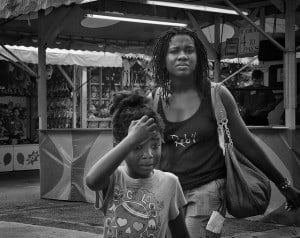Sorrow, questions, and press conferences followed the eruption of shootings in Chicago these past weeks. The violence peaked at 82 shootings and 14 fatalities alone over the 4th of July holiday weekend (See this site for yearly totals and maps). The Chicago Tribune has an entire web section titled, “Chicago Under the Gun,” to capture its coverage of photos and videos of the violence.
In one of the posted videos, titled “Mothers’ Lesson,” two African-American mothers bemoan and try to explain the violence in their neighborhood.
As they look at a crime scene at night, one of the mothers starts yelling at her son, telling him to shape up, to get straight “A”s, and go to college. She continues furiously, “this shouldn’t f–king be happening” and starts deriding parents in the neighborhood about how deplorable their failure is.
We feel the pain and anger watching the video and want to join in with the mother and the media in searching for answers. Jason L. Riley jumps right in, stretching out the conclusions of this desperate mother, writing in a Wall Street Journal blog titled “Chicago and Black Criminality.” He writes:
The problem is not our gun laws. Nor is it our drug laws, or racist cops, prosecutors and judges. The problem is black criminality, which is a function of black pathology, which ultimately stems from the breakdown of the black family.
This is the new vogue armchair sociology of linking some statistics about people of color, particularly African-Americans, and labeling it their entire races “culture” and a “pathology.”
Yet, in the chorus of blame in the video, the young man wanders away, looking wearied and annoyed. He probably had nothing to do with the shooting, but by simply being an African-American male, he is both blamed for the problems and asked to bear the burden to transform the entire situation for his people.
American racism, veiled but ever-present, feasts upon the forgetting of historical evils and loves using sociological lingo to blame present cultures and peoples for their state. While those who pulled the trigger and their parents must live with their sins and guilt, we can’t let a mother’s understanding of her neighbors, which are valid and contain truths, allow us to draw simplistic conclusions of entire cultures and races. Would the Chicago Tribune post such a video of on looking white neighbors making such conclusions and yelling at their kids if this was in a wealthy suburb like Wilmette? What “lesson” did the editors hope we gather from this?
This article by the New York Times shows a deeper analysis of the picture of poverty, race and lack of education in these neighborhoods where the shooting occurred. Such an analysis still is blind without an eye towards history, like this brilliant article from The Atlantic, “The Case for Reparations,” by Ta-Nehisi Coats, which describes the deep racists structures that were intentionally built and continue in Chicago.
We must join with the mother’s sorrow and demand that this stop, but also peer inward to the soul of our country that created such disparities and lives with it. Before jumping to ideas of individualist interventions to fix families and culture, we should think about whose culture created this situation in the first place.
